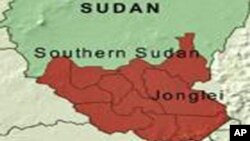In Sudan, the accord between north and south that ended decades of civil war, has also brought about social changes.
The Comprehensive Peace Agreement, the CPA, signed in 2005, allowed the south to create its own educational system.
The Dean of the Juba University College of Law, Professor Deng Awuor, says one of the changes has occurred in primary education, which he says has continued to evolve over the past 40 years.
“It used to be called elementary school,” he said, “then it used to be called primary school, and now it is called basic school. The elementary school used to be four years …and then in 1969… it became six years …and now the system is called basic school and is eight years.”
A number of non-governmental institutions and UN agencies are helping the Government of Southern Sudan.
In 2006, the United Nations Children Emergency Fund (UNICEF) launched a project it named “Go to School” aimed at encouraging children to attend primary school.
Officials of the region say that after Sudan’s independence, successive national governments in Khartoum changed the education system to achieve their own strategic policies. Some have negatively impacted the south.
“Before independence,” said Awuor, “the medium of instruction in south Sudan [were] the local languages and the English language. But after independence in 1956, the medium of instruction [throughout] Sudan shifted to Arabic, and up to now [Arabic has been imposed on us]. We had a problem with the curriculum, because in the south we speak our own languages.”
The CPA changed all that. With the signing of the accords, English as well as indigenous languages have been used by instructors, a move that Professor Awuor said has improved the quality of education.
The government of southern Sudan has said Sudan has not had an expansive or relevant educational system since the era of the so-called Condominium, or agreement between Britain and Egypt that restored Egyptian rule in the country from 1899 until 1955.
Awuor expressed confidence in the future of south Sudan’s educational reforms.
“[I’m optimistic that] the future is bright depending on the [full] implementation of the CPA, and also we are now hoping for a new government in the south… The future looks bright because for the first time we in the south are being allowed to determine our own history, our own education (and) our own destiny.”
Southern Sudan’s President Salva Kiir Mayardit has been quoted as saying "though the war is over, we have yet another war to fight.” In this new war against disease, hunger and poverty, he said, “the pen is the greatest weapon,” Kiir said.




